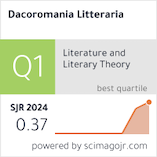2 | 2015
Free Access: The Circulation of Theoretical Ideas in Contemporary Literary Culture
Edited by Oana Fotache, Magda Răduţă

ISSN–L 2360 – 5189
[Text integral]
Contrary to its origins and areas of applicability, always “very” local and localized, literary theory aimed at reaching the status of a universal discourse on literature, a discourse that would identify and showcase in a display box the invariants beyond the cultural, historical, and geographical variables. As the anthropologist James Clifford ironically acknowledged in his manifesto “Notes on Travel and Theory” (Inscriptions, 5), “Localization undermines a discourse’s claim to ‘theoretical’ status”. The very history of literary theory as a (still) recent human science has incorporated and disguised local heritages while also highlighting in the process their transferable virtue, their mobile and generalizing capacity. The various narratives that accounted for theory’s beginnings, from the organicist ones such as R. Wellek’s History of Modern Criticism to those that value the breaking point as the constitutive motive of evolution (such as the introductions signed by Jonathan Culler, Terry Eagleton, or Antoine Compagnon, to name but a few), they all discreetly unify the variables of theoretical reflection into the apparently glorious perspective of a knowledge that makes its way through accumulating and filtering its data; a knowledge that is dubiously similar to the “hard” scientific one. First, theoretical discourse had to become more and more preoccupied with the theme of its own crisis for the motives of circulation, travel, and the unavoidable alteration of ideas to open up new lines worth investigating. […] If, as the same J. Clifford states, theory circulates lately on an unpredictable route, with many comebacks, reconfigurations and new exportations towards the former center (see, for instance, Gayatri Spivak’s case), the legitimate question would be now whether the conditions that make a theory mobile and functional have somehow changed. Seen until recently in direct connection with the system of disciplines – because theoretical circulation is enabled by the disciplinary dominant of a certain period –, these conditions acquire variable importance since the customary narrative of the West-to-East transfer has lost its unidirectional character, as well as the traditional distribution of power poles. The change that started with revisiting the Prague school in the ‘60s and with the new/old Lukács reinterpreted by Lucien Goldmann was to be continued from the ‘90s onwards by the enthusiastic dissolution of the former emergence centers. Among many other productive consequences, this triggered the possibility of a more careful reflection on the contemporary theoretical mobility. It is already very clear – as Didier Coste convincingly demonstrates in the opening of this thematic dossier – that open-mindedness, flexibility, and attention to ‘the real’ are to be counted among the essential attributes of contemporary theory. Without them mobility would be impossible; moreover, mobility is today the very condition of existence for theory: a static theory is a dead theory, states Didier Coste, and this view is shared by an entire direction of critical thinking that articulates the status of theory in a visible interdependence with the new world episteme that privileges active, dynamic, and easily adaptable forms, as in a creative and alert ergonomics.
Comparative Theory: Chronotopes and Circulation Practices. Argument / 5
Trajets théoriques / Theoretical Travel
Why the Center-Periphery Divide Makes No Sense: Modernity as a Traveling Sphere of Options / 43
[Abstract / Rezumat]
Reenactments of “the Secondary” – Within and Beyond the “Literary Turn” / 56
[Abstract / Rezumat]
L'identité de rôle – l’histoire discontinue d'une idée transatlantique / 66
[Abstract / Rezumat]
Révisiter les Empires / Revisiting Empires
Is the ‘Colonial’ in ‘Post-Colonial’ the ‘Soviet’ in ‘PostSoviet’? The Boundaries of Postcolonial Studies / 90
[Abstract / Rezumat]
Théories de l’Ouest, pratiques de l’Est / Western Theories, Eastern Practices
Towards a Rehabilitation of the Commonplace. Notes on the Romanian Readings of Jean Paulhan's Les Fleurs de Tarbes / 163
[Abstract / Rezumat]
Documents
Comptes rendus / Book Reviews
Sfinxul. Pierre Bourdieu şi literatura. [Le Sphynxe. Pierre Bourdieu et la littérature], Bucureşti, Art, 2014 (Magda Răduţă) / 231


